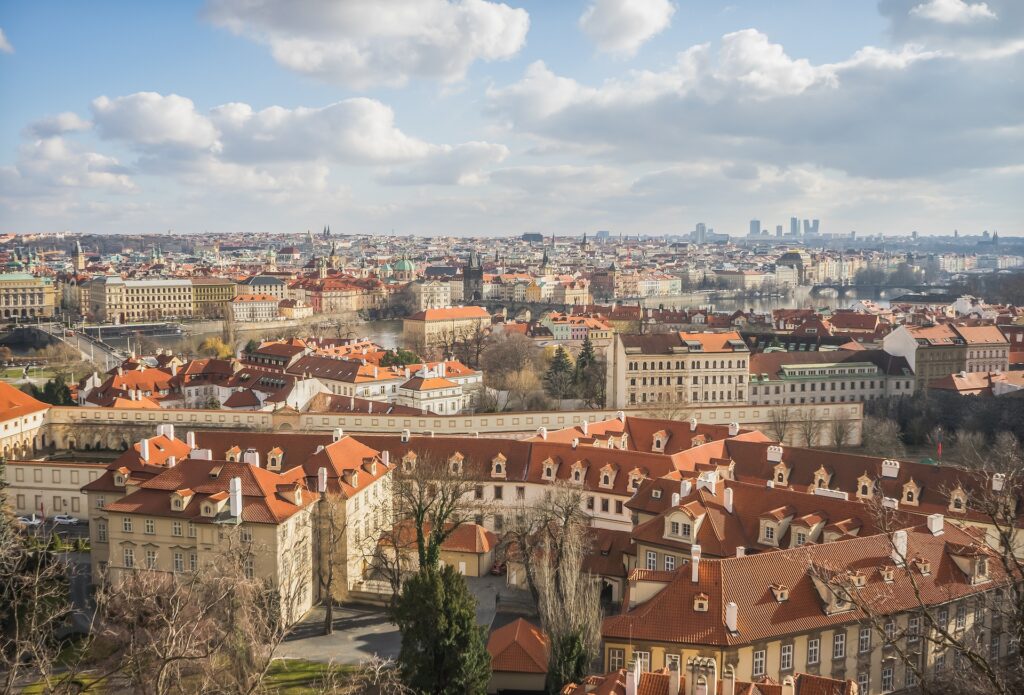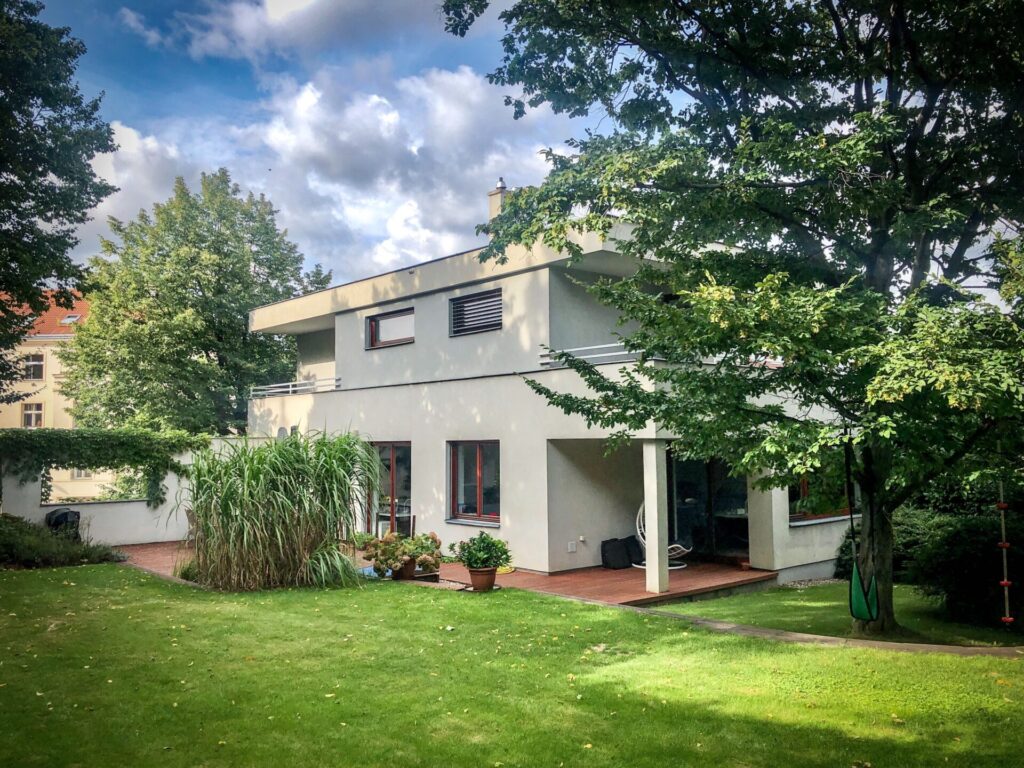Considering relocating to a new city for a fresh start in your career? Why not choose Prague? This captivating city offers a perfect blend of outdoor activities, safety, high quality of life, and an eccentric atmosphere.
Located in the heart of Europe, Prague truly has something for everyone–from lush greenery for outdoor sports to countless festivals, parties, and restaurants to explore. And with a consistent ranking among the safest and happiest places to live in the world, you can have peace of mind as you embark on your new career journey.
At AppAgent, more than 60% of our team members are foreigners who have made the move from countries like the US, Ukraine, Germany, and Moldova. In this article, we’ve compiled some useful tips from our colleagues that will help make your relocation to Prague as smooth and successful as possible.

What should every expat know before moving to Prague?
1. Different neighborhoods suit different personalities
Prague is a city with many neighborhoods, each with its unique character and charm. From the historic center to the more modern suburbs, there’s a neighborhood to suit every taste and lifestyle.
Stare Mesto, which is arguably the most well-known neighborhood in Prague, is home to many of the city’s iconic landmarks. While it’s a hub for shopping, dining, and entertainment, it’s also often bustling with tourists. If you’re looking for a quieter place to call home, you may want to consider other neighborhoods.
If you’re in the market for a more upscale experience, consider finding a flat in Vinohrady. Located just east of the city center, this neighborhood boasts a sophisticated atmosphere with trendy cafes, upscale restaurants, and designer shops. It’s a popular destination for expats and young professionals, and it’s known for its art nouveau architecture.
For a more laid-back vibe, head to Žižkov. This neighborhood is home to a large student population, and it’s known for its bohemian atmosphere and quirky street art. It’s also a great place for nightlife, with a variety of bars and clubs that cater to a younger crowd.
Another neighborhood worth mentioning is Smíchov, located on the west bank of the Vltava River. It’s a popular destination for young professionals and families, with a mix of modern amenities and historic charm. Overall, Smíchov is a great neighborhood for those who want to be close to the city center but still enjoy a more laid-back and family-friendly atmosphere.
Must-See Spots & Hidden Gems in Prague:
If you’re new in town, don’t miss Prague Castle, Letná Park’s panoramic beer gardens, or the quirky sculptures in the John Lennon Wall area. For weekends, day trips to Karlštejn Castle or hiking in Divoká Šárka are a must. The city is full of secret courtyards, independent coffee shops, and underground music venues—there’s always something unexpected to stumble upon!

2. Public transportation will be your best friend
Prague has an efficient and extensive public transportation system that makes it super easy to get around the city.
One popular form of public transport is the metro, which has three lines that run throughout the city. The metro runs from 5 a.m. until midnight, with trains arriving every few minutes during peak hours and every 5-10 minutes during off-peak hours. And unlike many other metropolises, Prague’s metro is clean, safe, and easy to navigate, with signs and announcements in both Czech and English.
With their iconic red and white design, trams are a symbol of the city. Prague’s tram network is one of the largest in the world and covers most of the city, including many areas that are not served by the metro.
Many locals use PID Lítačka, an electronic smart card that allows you to purchase tickets for trams, buses, and the metro. The price for an annual ticket for adults is 3,650 CZK (which rounds out to 10 CZK per day)–a great deal for anyone who uses public transportation on the regular!
Cost of Living Breakdown (2024 update)
Living in Prague is still very affordable compared to other major European capitals, but costs are slowly rising. Here’s a quick average monthly cost snapshot for expats (as of 2024):
Shared apartment: 10,000–15,000 CZK
Private 1-bedroom: 18,000–25,000 CZK (city center)
Transport pass: 3,650 CZK/year
Meal at a restaurant: 150–300 CZK
Coffee: 50–70 CZK
Pro tip: Many local shops only accept cash, but most places take cards—especially in the city center.

3. Beer is cheaper than water (yes, seriously)
Beer in the Czech Republic is famously inexpensive, and it’s often cheaper than bottled water. But there are a few other things you should take into account when calculating your expenses in Prague.
The cost of living is relatively affordable compared to other European cities, but prices can vary depending on the neighborhood, type of accommodation, and lifestyle. As a general guideline, a single person can expect to spend around 20,000-30,000 CZK per month on living expenses, including rent, utilities, food, and transportation.
Prague for Remote Workers & Digital Nomads
Prague’s coworking scene is thriving. Whether you want creative energy (Pracovna, Coffice), a business vibe (WeWork, HubHub), or just free Wi-Fi in hipster cafes (Můj šálek kávy in Karlín), you’ll find your spot. Many apartments come with fast fiber internet, and the cost of a SIM with unlimited data starts from about 600 CZK/month.

4. Be prepared for some serious bureaucracy
Relocating to Prague from both inside and outside of the EU involves navigating a complex bureaucratic process. The first step is obtaining the necessary visa, which depends on your country of origin and the purpose of your stay. If you are a citizen of an EU member state, you do not need a visa to stay in Prague, but you need to register with the Czech authorities if you plan to stay longer than 90 days.
If you are from outside the EU, you will need to apply for a long-term visa, which typically requires proof of employment or enrollment in a Czech educational institution. Once you have your visa, you will need to register your residency with the Czech authorities within three days of your arrival in the country.
Navigating the bureaucracy in Prague can be challenging and time-consuming, especially if you don’t speak Czech. In many cases, it’s worth hiring a relocation specialist or immigration lawyer to help you with the process. Some companies even offer relocation and visa support for their employees, which can lift a huge weight off your shoulders!
Healthcare and Insurance Tips
Prague offers excellent healthcare, with many clinics and doctors speaking English or German. If you’re an EU citizen, bring your EHIC card. Non-EU residents should make sure their insurance meets Czech requirements before arrival. Private medical centers like Canadian Medical and uLekare.cz make it easy to get care, and many companies offer healthcare support as part of their benefits.
5. Czech language is difficult…but worth learning
For English (and often, Russian) speakers living in Prague, it’s easy to overlook the importance of learning the Czech language. The city center may be dotted with English-speaking Czechs, but once you venture outside of the tourist hotspots, you’ll quickly discover the value of knowing at least some basic vocabulary. Plus, learning the language can greatly enhance your experience in Prague by allowing you to submerge yourself in the culture and connect with locals on a deeper level!
Learning to speak Czech can be a daunting prospect, especially for those unfamiliar with the Slavic language. Immersing yourself in the language and culture is key to learning, and there are many resources available to help you along the way. Joining language exchanges, attending language schools, and even hiring a private tutor are all great ways to improve your skills and connect with the local community.
When searching for a job, check to see if the company offers language lessons as part of its benefits package – this is a great way to jump-start your way to fluency!
Making Friends and Getting Connected
Moving to a new city is easier when you join the local expat community! Check out Meetup.com for language exchanges, hiking groups, and board game nights. Facebook groups like “Foreigners in Prague” or “Prague Expats” are great for finding advice, events, and even apartments. Don’t hesitate to ask colleagues for recommendations—they’ll be happy to show you their favorite haunts.
Quick Tips from Expats, for Expats
- If you are from a megapolis, Prague may feel very slow (in a nice way); adjust your expectations accordingly.
- If you’re living far from the city center, make sure you have a metro line nearby.
- During the holiday season, buy your gifts in advance–shops are often closed and deliveries can be delayed!
- Prague is an extremely dog-friendly city, so consider adopting if you don’t already have a furry friend at home.
- Czech people are known for their love of outdoor activities, particularly hiking and skiing. Don’t be afraid to explore the country’s beautiful landscape!
- If you find a flat near your workplace (and it’s possible), you can walk or commute by bike every day.
- Buy warm pajamas for the winter…heating can be found in every flat or house, but it’s very expensive!
- When searching and registering for a flat, try to recruit the help of a native speaker. All of your documents will likely be in Czech.
Navigating the Seasons—What to Pack and Expect
Prague’s weather can surprise you! Winters are cold and sometimes snowy (think -5°C to 5°C), so pack warm layers and waterproof boots. Summers are mild, with plenty of sun and temperatures between 20–30°C. Spring and fall bring beautiful parks and plenty of reasons to be outdoors. Locals love their outdoor markets, beer gardens, and river cruises—don’t miss them!
Careers at AppAgent
So now that you know everything there is to know about relocating to Prague, it’s time to search for your dream job. Why not dip your toes into the exciting world of mobile apps and games?
Our creativity and expertise in mobile marketing help the best apps and games grow, reach millions of users and players around the world and bring them positive change.
And a reward for your enthusiastic work? Your fast-paced professional growth within a vibrant multinational team and appreciation from top game and app publishers.
See our available positions here.
Why Prague is Perfect for Career Growth
As the tech and mobile industries boom, Prague is fast becoming a hub for creative professionals, developers, marketers, and designers. The city’s international vibe and affordable lifestyle make it easy to network, upskill, and move up in your career.
At AppAgent, you’ll join a team that values learning, diversity, and work-life balance—a rare combo in today’s fast-paced world.
What we offer
- A pet-friendly villa office with a beautiful garden where we eat, brainstorm and hang out after work (take a sneak peek into our office).
- Thoughtful employee care:
- Relocation and visa support
- Multisport Card, massages in the office, uLekare.cz, psychotherapy support
- A comfy bed in the office for occasional sleepovers, electric scooter for faster transport
- Time for rest: 26 days of paid leave, 2 weeks working from anywhere, generous sick leave, flexible hours and days.
- Education support: paid industry experts consultations, conferences, online courses, language lessons, and company library.
- After-work activities: team buildings, company offsites, and a 2-week Winter Escape in warmer countries.
Ready to make the move?
If you’re considering a fresh start in Europe, Prague checks all the boxes: vibrant culture, global career opportunities, an expat-friendly community, and a quality of life that’s hard to beat.
Curious about life at AppAgent? [See our open roles and join us in Prague!]


















